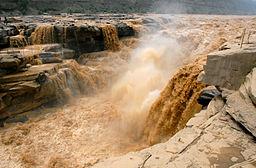Yellow River
| Yellow River (黄河) | |
| Huáng Hé | |
|
The Yellow River at the Hukou Falls.
|
|
| Country | China |
|---|---|
| States | Qinghai, Sichuan, Gansu, Ningxia, Inner Mongolia, Shaanxi, Shanxi, Henan, Shandong |
| Tributaries | |
| - left | Fen River (and many smaller rivers) |
| - right | Tao River, Wei River (and many smaller rivers) |
| Source | Bayan Har Mountains |
| - location | Yushu Prefecture, Qinghai |
| - elevation | 4,800 m (15,748 ft) |
| - coordinates | 34°29′31″N 96°20′25″E / 34.49194°N 96.34028°E |
| Mouth | Bohai Sea |
| - location | Kenli County, Shandong |
| - elevation | 0 m (0 ft) |
| - coordinates | 37°46′48″N 119°15′00″E / 37.78000°N 119.25000°ECoordinates: 37°46′48″N 119°15′00″E / 37.78000°N 119.25000°E |
| Length | 5,464 km (3,395 mi) |
| Basin | 752,546 km2 (290,560 sq mi) |
| Discharge | |
| - average | 2,571 m3/s (90,794 cu ft/s) |
|
Map of the Yellow River in China
|
|
| Yellow River | |||||||||||||||||||||||||||||||||

"Yellow River" in Simplified (top) and Traditional (bottom) Chinese characters
|
|||||||||||||||||||||||||||||||||
| Chinese name | |||||||||||||||||||||||||||||||||
|---|---|---|---|---|---|---|---|---|---|---|---|---|---|---|---|---|---|---|---|---|---|---|---|---|---|---|---|---|---|---|---|---|---|
| Simplified Chinese | |||||||||||||||||||||||||||||||||
| Traditional Chinese | |||||||||||||||||||||||||||||||||
| Postal | Hwang Ho | ||||||||||||||||||||||||||||||||
|
|||||||||||||||||||||||||||||||||
| Tibetan name | |||||||||||||||||||||||||||||||||
| Tibetan | རྨ་ཆུ། | ||||||||||||||||||||||||||||||||
|
|||||||||||||||||||||||||||||||||
| Mongolian name | |||||||||||||||||||||||||||||||||
| Mongolian | Хатан гол Ȟatan Gol Шар мөрөн Šar Mörön |
||||||||||||||||||||||||||||||||
| Transcriptions | |
|---|---|
| Standard Mandarin | |
| Hanyu Pinyin | Huáng Hé |
| Wade–Giles | Huang2 Ho2 |
| IPA | [xwǎŋ xɤ̌] |
| Wu | |
| Romanization | Wån入 Ghu平 |
| Yue: Cantonese | |
| Yale Romanization | Wòhng hòh |
| Jyutping | Wong4 ho4 |
| Southern Min | |
| Tâi-lô | N̂g hô |
| Middle Chinese | |
| Middle Chinese | Hwang Ha |
| Old Chinese | |
| Baxter-Sagart | *N-kʷˤaŋ [C.q]ˤaj |
| Transcriptions | |
|---|---|
| Wylie | r Ma chu |
| THDL | ma chu |
The Yellow River or Huang He (![]() listen) is the second-longest river in Asia, following the Yangtze River, and the sixth-longest river system in the world at the estimated length of 5,464 km (3,395 mi). Originating in the Bayan Har Mountains in Qinghai province of western China, it flows through nine provinces, and it empties into the Bohai Sea near the city of Dongying in Shandong province. The Yellow River basin has an east–west extent of about 1,900 kilometers (1,180 mi) and a north–south extent of about 1,100 km (680 mi). Its total basin area is about 742,443 square kilometers (286,659 sq mi).
listen) is the second-longest river in Asia, following the Yangtze River, and the sixth-longest river system in the world at the estimated length of 5,464 km (3,395 mi). Originating in the Bayan Har Mountains in Qinghai province of western China, it flows through nine provinces, and it empties into the Bohai Sea near the city of Dongying in Shandong province. The Yellow River basin has an east–west extent of about 1,900 kilometers (1,180 mi) and a north–south extent of about 1,100 km (680 mi). Its total basin area is about 742,443 square kilometers (286,659 sq mi).
Its basin was the birthplace of ancient Chinese civilization, and it was the most prosperous region in early Chinese history. However, because of frequent devastating floods and course changes produced by the continual elevation of the river bed, sometimes above the level of its surrounding farm fields, it also has the names China's Sorrow and Scourge of the Sons of Han.
Early Chinese literature including the Yu Gong or Tribute of Yu dating to the Warring States period (475 – 221 BC) refers to the Yellow River as simply (Old Chinese: *C.gˤaj, modern Chinese (Pinyin) Hé), a character that has come to mean "river" in modern usage. The first appearance of the name (Old Chinese: *N-kʷˤaŋ C.gˤaj; Middle Chinese: Huang Ha) is in the Book of Han written during the Eastern Han dynasty about the Western Han dynasty. The adjective "yellow" describes the perennial color of the muddy water in the lower course of the river, which arises from soil (loess) being carried downstream.
...
Wikipedia


